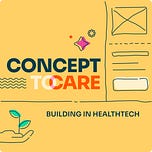Matthew Woo is the Co-founder, President, and Chief Product Officer at Summer Health, where he heads the development of a tech-enabled, text-first pediatric care platform. Summer Health provides parents with fast, convenient access to pediatricians through text, offering responses within minutes. Matthew has been instrumental in integrating AI into their workflows, ensuring that busy parents can manage their children's health needs quickly and effectively while aiming to reduce potentially unnecessary emergency room visits or lengthy waiting room stays. In our conversation, Matthew shares his insights on:
AI Basics for Healthcare: Matthew walks us through the fundamentals of AI, offering a clear explanation of how AI is being applied in today’s healthcare landscape and what makes it such a powerful tool for clinicians.
Operationalizing AI in Healthcare: Insights into how Summer Health has deployed AI in low-risk, high-reward areas, the importance of rapid iteration, and how they ensure data privacy and security in their AI deployments.
AI Integration at Summer Health: Matthew details how AI has been integrated into clinical workflows at Summer Health, addressing inefficiencies and improving patient care through tools like medical note generation and patient history summarization.
Scaling AI and Key Metrics: Practical strategies for scaling AI across teams and the key metrics that Summer Health tracks to measure the success and impact of their AI initiatives.
Ethics and AI in Healthcare: How Summer Health ensures that AI tools are safe, fair, and bias-free, with clinicians involved in every critical decision made by AI.
Building an AI-First Culture: The steps Summer Health has taken to foster an AI-first culture, including training and empowering teams, aligning AI with strategic goals, and fostering a culture of experimentation and rapid iteration.
In this episode of Concept to Care, Matthew provides a deep dive into how AI is transforming healthcare at Summer Health. His insights on the practical application of AI, scaling its use, and building a culture that supports innovation and collaboration are invaluable for healthcare product leaders looking to leverage AI in their own organizations.
Some takeaways:
AI Basics for Healthcare: Matthew Woo starts by walking the audience through the basics of AI, defining key concepts to lay a foundation for understanding its role in healthcare.
Defining AI: Matthew describes AI, or artificial intelligence, as the use of machines or computers to simulate human intelligence. This includes decision-making, reasoning, and problem-solving, allowing AI to take on tasks that typically require human cognitive abilities. AI is not a new concept—it was first introduced in the 1950s—but its capabilities have evolved significantly due to advances in computing power and data availability.
How AI Works: At its core, AI systems are built to analyze large amounts of data, recognize patterns, and make predictions or recommendations based on that data. For example, in healthcare, AI can be used to analyze medical images or predict patient outcomes based on historical data.
Evolution of AI: Matthew highlights the progression of AI from its early stages to modern-day applications. Initially, AI was used to create "expert systems," which encoded human expertise into rule-based systems for tasks like diagnostics. However, with the advent of technologies like deep learning and neural networks, AI can now learn from vast datasets and adapt its responses based on new information.
AI in Today’s Healthcare: In the healthcare sector, AI plays an increasingly critical role. It can assist in diagnostics, suggest treatment plans, and even predict patient outcomes. For example, AI can help radiologists interpret medical images or help clinicians identify patterns in patient data that may not be immediately obvious. AI’s growing presence in healthcare allows for faster, more accurate decision-making and the ability to provide care at scale.
Different Types of AI
Machine Learning (ML): Matthew describes machine learning as a branch of AI that uses large amounts of data to make predictions. ML has been traditionally applied in healthcare for tasks like classification and ranking, such as helping radiologists detect issues in scans. However, this form of AI requires substantial investments in data and infrastructure, and its use cases have typically been narrow and specialized.
Generative AI: Matthew explains that generative AI has gained prominence with models like OpenAI’s GPT. Unlike traditional machine learning, which focuses on specific tasks, generative AI is capable of producing outputs such as medical notes or care plans. At Summer Health, generative AI is used to assist clinicians by drafting medical documentation, saving time and improving workflow efficiency.
Transformers and GPT: Matthew references the development of transformer models, particularly those like GPT, which became more powerful with larger datasets. These models are able to generate coherent responses and assist in healthcare contexts, such as summarizing patient information or generating care plans, allowing healthcare professionals to focus more on patient care.
Operationalizing AI in Healthcare
Start Small with Low-Risk, High-Impact Tasks: Matthew shared insights on how Summer Health operationalizes AI by focusing initially on low-risk, high-impact areas such as drafting medical notes. Rather than applying AI to high-stakes clinical decisions, they began with administrative tasks where mistakes are less critical, allowing for faster deployment and measurable efficiency gains. He also emphasized the importance of ensuring data privacy by working with safeguards like having a Business Associate Agreement (BAA) with OpenAI, ensuring patient data security while using AI tools.
Rapid Iteration and Clinician Feedback: Another key strategy was rapidly testing AI models in real-world workflows and collecting clinician feedback quickly. By tracking how often clinicians use AI-generated outputs and what adjustments they make, Summer Health continuously fine-tunes its models to improve both accuracy and user satisfaction, ensuring AI adds value without disrupting clinician workflows.
AI Integration at Summer Health
AI Integration into the Platform: Matthew explained that Summer Health started by integrating AI into low-risk, administrative tasks before expanding its use to clinical workflows. AI is deployed in non-real-time applications initially, such as drafting medical notes after patient interactions. This integration has streamlined processes and enhanced operational efficiency by reducing the time spent on documentation.
Problems AI Addresses: AI at Summer Health primarily addresses the inefficiency in clinical workflows and repetitive tasks. For example, AI-generated medical notes allow clinicians to spend less time on administrative work and more time on patient care. It also helps with summarizing patient histories for specialists, reducing the need for patients to repeat themselves, and improving the continuity of care.
Some of the Most Impactful Use Cases at Summer Health Where AI Was Deployed:
Medical Note Generation: AI drafts medical notes based on patient-doctor interactions. This has cut the turnaround time from 48 hours to 15 minutes, allowing patients to receive their care plans more quickly and feel more supported.
Patient History Summarization: AI summarizes a patient’s past visits and interactions, providing clinicians with a clearer picture of the patient’s medical history. This is especially useful when specialists or new doctors are brought into a case, improving continuity of care.
Provider Efficiency: AI tools at Summer Health help clinicians by reducing administrative burdens, such as preparing reminders, care plans, and even helping with coding for billing. This frees up time for clinicians to focus on complex, high-touch patient interactions.
Scaling AI and Key Metrics at Summer Health
Strategies for Scaling AI: Matthew explained that scaling AI at Summer Health involves making AI tools accessible across teams and continuously improving them through feedback loops. AI applications are designed to be used by a wide range of team members, from engineers to clinicians, allowing rapid iteration and deployment. They’ve invested in creating a platform that enables quick integration of new AI use cases and encourages team members to explore new AI applications. This scalability comes from developing tools that can be easily applied and adapted for different workflows.
Key Metrics Driven by AI: Summer Health uses several metrics to measure the impact of AI. These include:
Clinician Utilization: Tracking how often clinicians use AI-generated outputs, such as medical notes or care plans, helps assess whether the tools are improving efficiency. They also measure how much clinicians modify AI-generated content.
Time Efficiency: AI is tracked for its impact on turnaround times, such as reducing the time from patient interaction to the delivery of a care plan.
Patient Engagement: They monitor patient satisfaction scores to ensure that AI-driven interactions improve the patient experience. Increased patient engagement and faster care delivery are key signs of success.
Content Accuracy: By measuring the accuracy and helpfulness of AI-generated outputs, particularly in clinical settings, they ensure that AI supports quality care.
Ethics and AI in Healthcare
Human-in-the-Loop Model: Matthew emphasized that Summer Health maintains a human-in-the-loop approach to ensure AI does not make critical decisions without clinician oversight. AI-generated outputs, such as medical notes or care plans, are always reviewed and approved by clinicians before being finalized, ensuring that AI augments, rather than replaces, human judgment in high-risk medical situations.
Bias and Fairness: Summer Health works to mitigate bias in AI models by carefully monitoring outputs for any unintended biases, particularly in clinical decision-making. They continuously refine AI algorithms based on feedback and results to ensure they work equitably across different patient populations.
Data Privacy and Security: To protect patient data, Matthew highlighted the importance of strict privacy measures, including the use of Business Associate Agreements (BAAs) with AI service providers like OpenAI. This ensures that any patient data processed by AI models is handled in compliance with HIPAA regulations, protecting patient confidentiality.
Transparent Accountability: Summer Health encourages transparency in AI usage by keeping clinicians informed about how AI tools are developed and deployed. This fosters trust and allows clinicians to understand and control how AI tools are applied in their workflows.
Monitoring and Feedback Loops: The organization actively tracks how AI-generated recommendations are used and modified by clinicians. This monitoring and feedback system allows them to identify potential risks, continuously improve AI models, and ensure safety is maintained throughout patient interactions.
Building an AI-First Culture: Summer Health has implemented several key strategies to foster an AI-first culture, ensuring AI is embedded in their core operations and workflows:
Training and Empowering Teams: One of the first steps Matthew and his team took to build an AI-first culture was ensuring that all teams—clinicians, engineers, and even non-technical staff—understood the potential of AI and how it could be applied in their work. Matthew emphasized upskilling teams through internal training sessions on AI tools and technologies, which empowered them to identify areas where AI could be most impactful.
Aligning AI with Strategic Goals: AI initiatives were always aligned with Summer Health’s larger strategic goals of improving patient care and increasing efficiency. Every AI project was vetted for its potential to drive these outcomes, ensuring that AI was a core part of the company’s strategy rather than a standalone initiative.
Fostering an Experimental Mindset: Matthew mentioned that Summer Health encouraged a culture of experimentation where teams were not afraid to try new AI tools and approaches. By normalizing experimentation and learning from failure, they created an environment where innovation around AI was continuous.
Rapid Prototyping and Iteration: To keep the AI-first momentum, Summer Health adopted a rapid prototyping and iteration process. Matthew mentioned that AI tools were quickly built, tested in live workflows, and refined based on user feedback. This iterative approach helped teams see immediate results, making them more likely to continue exploring AI-driven improvements.
Pragmatic Approach to AI
Start Small with Proven Use Cases: Matthew emphasized the importance of starting with low-risk, high-reward applications of AI. Teams should focus on areas where AI can demonstrate quick wins, such as automating administrative tasks or generating medical notes. By starting with simple, well-defined use cases, teams can build confidence in AI’s value before moving on to more complex applications.
Leverage Existing Expertise: Rather than hiring large AI teams from the start, Matthew encourages teams to leverage existing in-house talent. Engineers and clinicians who understand the company’s needs are well-positioned to identify where AI can add value. AI tools today are accessible, making it easier for non-AI specialists to integrate AI into workflows with minimal training.
Rapid Experimentation and Feedback: Teams should adopt a rapid experimentation mindset when deploying AI. Matthew recommends running small pilot programs, gathering feedback quickly from end users, and iterating based on real-world usage. This approach allows teams to refine AI models without making large, upfront investments, and ensures the AI tools align with user needs.
—
Where to find Matthew Woo:
email: matthew@summerhealth.com
Summer Health: https://www.summerhealth.com/
—
Where to find Angela and Omar:
Angela Suthrave
Omar Mousa
—
Referenced:
Summer Health: https://www.summerhealth.com/
Discount Code for Summer Health: “summertime”
Summer Health is hiring a VP of Engineering: https://jobs.ashbyhq.com/summerhealth/4346cf78-0fae-4400-8c6e-6196ad3ec44e
Meetups: https://www.meetup.com/
Intercom: https://www.intercom.com/
WhatsApp: https://www.whatsapp.com/
Facebook Marketplace: https://www.facebook.com/marketplace
Some history on AI: https://www.weforum.org/agenda/2024/10/history-of-ai-artificial-intelligence/
AI hallucination: https://cloud.google.com/discover/what-are-ai-hallucinations
Transformer: A Novel Neural Network Architecture for Language Understanding: https://research.google/blog/transformer-a-novel-neural-network-architecture-for-language-understanding/
Open AI: https://openai.com/
Zero data retention API at Open AI: https://community.openai.com/t/zero-data-retention-information/702540
Anthropic: https://www.anthropic.com/
Abridge: https://www.abridge.com/
Nabla: https://www.nabla.com/
Strawberry AI model: https://www.wired.com/story/openai-o1-strawberry-problem-reasoning/
Matthews favorite product to help him unwind from his tech: https://www.boox.com/
Jeff Bezo’s Decision Making Framework: https://coda.io/@hales/jeff-bezos-make-fast-decisions
Voice notes app: https://voicenotes.com/
—
Check out our website: https://www.concepttocare.com
Follow us and Subscribe wherever you get your podcast:















Share this post